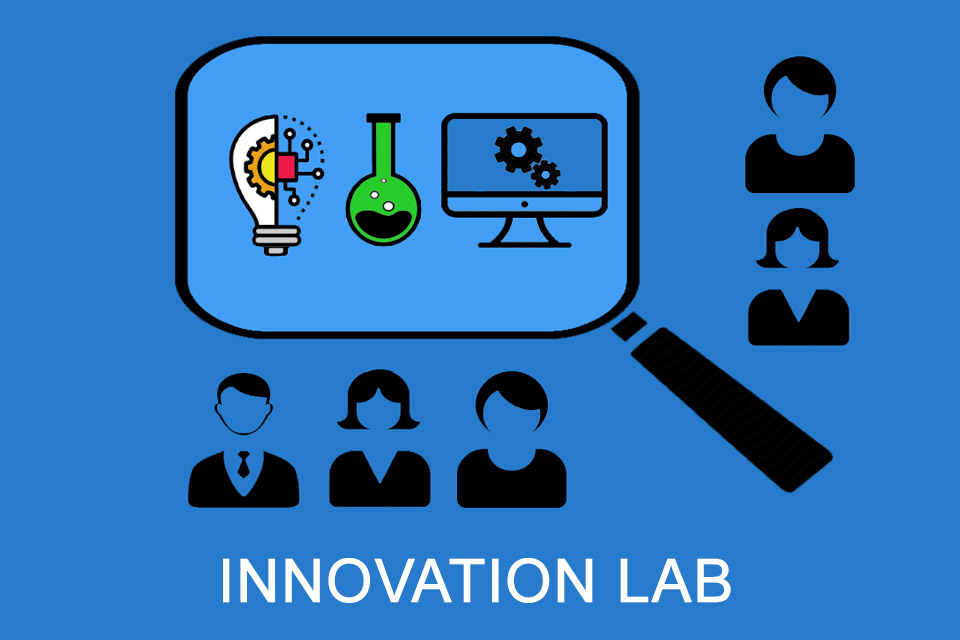What is an Innovation Lab?
Smartpedia: An Innovation Lab is a specialized organisational unit for the development of products, services or processes. Sometimes it is also understood as a creative space.
Innovation Lab – the special organisational unit for innovations
An Innovation Lab is a specialized organisational unit that deals with innovations – from idea generation to possible market launch. In many companies, it is located outside the traditional organisational structure. In some publications, an Innovation Lab is also defined as a virtual or physical space in which employees of one or more companies work creatively and jointly. This interpretation is based above all on the term “lab” as an expression for laboratory, and thus on a workplace where experiments, tests, measurements and inspections are carried out.
Innovation labs are also referred to as think tanks, design labs or digital labs. In some companies, the name of the organisational unit already expresses the intention: a digital lab focuses on digitisation, an education innovation lab on education, a research lab on the research of materials or processes, etc.
What are Innovations?
The topic of innovation and the concrete examination of innovations is decisive for the future of many companies. In the context of a company, an innovation refers to all products, services and processes that the company uses and introduces for the first time. The innovation of a company therefore does not have to be an innovation for another company. A distinction is usually made between evolutionary or incremental innovations as further developments of existing products, services and processes, and revolutionary or radial or disruptive innovations that create completely new products or services and thus sometimes new markets.
There are different types of Innovation Labs:
- The company’s own lab is the most common form of innovation lab. Companies deliberately build it outside the company’s organisation because they know how quickly the continuous debate on innovations in day-to-day business falters and how easily possible doubters can destroy ingenious ideas if they are given the opportunity to do so. In practice, it therefore happens that employees work full-time in the Innovation Lab or use fixed periods of time – e.g. every Friday – for this purpose. Ideally, an Innovation Lab should act as a company within the company, working agilely, flexibly and with flat hierarchies.
- Incubators are think tanks in which many different parties exchange ideas in the hope of profiting from each other. The term incubator comes from medical technology and its use in the context of innovation is of course intended, because incubators offer controlled conditions for development and growth. There are sometimes different statements in publications as to whether incubators are internal employees from other divisions or external supporters. If they are external experts, they may provide start-up capital, know-how, contacts, market access, etc.
- Accelerators are a kind of program in which companies or start-up teams apply to receive support from them. Accelerator programs are often referred to as boot camps for innovation. They pursue the clear goal of bringing a product or service to market maturity within a defined period of time. Compared to an incubator, it is not so much a matter of creating new ideas, but of achieving economic success in the shortest possible time. In practice, the terms incubator and accelerator often become blurred. If terms such as Business Angels, Venture Capitalists, Company Builder or Open Innovation are added, then differentiation is rather of an academic nature and in practice of little relevance.
Sometimes we speak of coworking labs. However, these labs have little to do with innovation as such, but provide work surfaces and materials (tables or Internet connections for instance). Grassroot Labs also offer space, mostly in the form of workshops, where materials can be worked with and experimented with. Both forms are supported by the rent of the workers.
Activities and tasks in the Innovation Lab
The tasks that an Innovation Lab has to perform have to be defined individually. It may take care of
- the identification and generation of ideas,
- the preliminary analysis of the idea with the aim of identifying opportunities and risks,
- the carrying out of feasibility studies,
- the procedures for developing the new product or service,
- tests and inspections of products and services.
In some organisations, the market launch is also one of the tasks of the Innovation Lab, but this task is usually performed within the company with the help of marketing, sales, support, documentation, controlling, etc.
There is a long list of creativity techniques and methods to develop and launch innovations. Here is a small selection:
- Brainstorming, Brainwriting or Braindumping
- Design Thinking or Design Sprint
- Field observation, interviews or Apprenticing
- Prototyping, Rapid Prototyping or Walking Skeleton
- Minimum Viable Products
- …
As a result of the clear separation between the organisational structure of the company and the detached Innovation Lab, a “clash of cultures” can often be observed. On the one hand there are the creative people, on the other there are the workers, whose tasks often include the realisation and implementation of the new ideas. Free spirits and those who finance the work of the free spirits meet. A start-up mentality meets an existing, grown structure, cool rooms meet old office chairs, etc.
In such a setting it is not surprising that competitive thinking can occur and that as a result there are difficulties in actually implementing new ideas in the company, through the affected areas, departments and employees. It is not enough just to propagate an atmosphere of tolerance and openness in the Innovation Lab, it is also important to establish corresponding values in the company. If this is successful, the chances for innovation are good.
Impulse to discuss
If innovation labs are founded with the claim of being deliberately different from their parent organisation, doesn’t a “clash of cultures” occur almost automatically?
Notes:
Here you can find an interesting TED Talk about innovation labs.
If you like the article or would like to discuss it, please feel free to share it in your network. And if you have any comments, please do not hesitate to send us a message.
Here you can find additional information from our t2informatik Blog:



